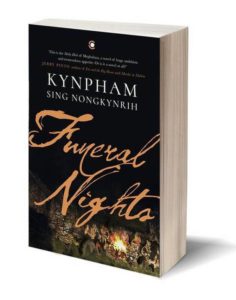By Kanchan Verma
Kanchan Verma reviews the unusual yet intriguing fictional work based on Sohra’s local bred Kynpham Sing Nongkynrih’s insight into the Khasi community that Jerry Pinto has described  as the ‘Moby Dick of Meghalaya’.
as the ‘Moby Dick of Meghalaya’.
Drawing out some of the most fascinating sections, the reviewer advises a word of caution that one should not make the mistake of reading Funeral Nights like a conventional novel with a conventional plot. The narrative frame is inspired by Boccaccio’s The Decameron and The Arabian Nights. The style is serio-comic, and the novel is ‘packed like a travel bag.’
In Kynpham’s epic-length debut novel, Funeral Nights, ‘a group of friends from Shillong journey to a remote part of West Khasi Hills to witness Ka Phor Sorat, the feast of the dead, a unique six-day-long funeral ceremony of the Lyngngams, a Khasi sub-tribe. The ceremony—involving a number of strange rituals—will conclude with the cremation of an elderly woman whose body has been preserved in a tree house for nine whole months’.
By mistake, however, the group ends up reaching the secluded hamlet of Nongshyrkon seven days early. Stuck in the jungle, they spend their nights around a fire in the middle of a spacious hut, sharing stories and debating issues.
The result of these nightly fireside chats is Funeral Nights, one of the most unconventional novels I have read. The novel has been described as ‘a vast collection of stories big and small, not so much about death, but about life, past, present and future, rural and urban, high and low; about admirable men and women, raconteurs and pranksters, lovers and fools, politicians and conmen, drunks and taxi drivers; about culture and history, religion and God, myth and legend’.
It is indeed a heady mix and through all of it emerges the life and character of a people caught in the tension between tradition and modernity, culture and change, the old religion and the hegemony of Christianity, ethnic survival and influx, militancy and the scammers of democracy. Throughout its 12 substantial chapters, the novel is divided into ‘Root Stories’ and ‘Little Stories’, which ‘reveal not only their specific qualities but also their humanity and universality’.
Many of them, hilarious yet meaningful, provide much-needed comic relief, coming as they do immediately after every serious conversation on weighty contemporary issues. It is to this part of the book that Satchidanandan referred when he remarked: ‘Here is a book of rare scholarship that Mircea Eliade or Claude Levi Strauss would have read with admiration …’ But since these sections are presented in the form of Socratic dialogues and illustrated with illuminating examples and stories, they ‘remain as accessible as fiction to the lay reader.’
I am especially drawn to the morals attached to each little story in the ‘Little Stories’ chapters. Many of these morals have the ring of a proverb and the wisdom of a maxim. The following is a story with such a maxim:
One day, not too long ago, a Bengali professor issued an advertisement announcing her requirement for a housemaid who would not only look after the house but also help take care of her two-year-old son. Because the wage she offered was a rather generous one, many girls from her locality applied for the job. Seeing so many applicants, she decided to interview them so she could choose the most suitable candidate. But that presented another problem. Most of the girls were Khasi and did not know much English or Hindi. What was she to do? She herself did not know much Khasi. As a last resort, therefore, she sought the help of a Khasi taxi driver who used to drop her to work every day and he readily agreed to help her.
During the interview, the girls, waiting outside on the veranda, were called to the drawing room one by one.
When the first girl came in, the professor and Bah Warjri immediately began plying her with questions. But the girl was so shy that she stared at the floor, smiled foolishly to herself and refused to say a word. The plumpish professor looked at Bah Warjri, her dark eyes questioning him silently. Bah Warjri, who was sitting on a chair, his folded arms resting on his paunchy stomach, looking very much like a meditating Buddha, shook his head and commented: ‘No network.’
The second girl was exactly the opposite. Before the interviewers could ask her questions, she began talking non-stop … giving them no chance at all to speak. Bah Warjri looked at the professor, shook his head, and said: ‘Customer service.’
The third girl was not very nicely behaved … She boasted about having worked in many places around India. Bah Warjri gave the professor a sign and said: ‘Tourist taxi.’
And so the interview progressed … the professor was getting quite anxious. At last, a girl came in who seemed well suited for the job. She was well behaved, clean and neatly dressed. When they asked her questions, she answered them clearly and politely. She was really perfect in every way. Even Bah Warjri was impressed with her. He looked at the professor, nodded, and said: ‘Maruti 800. Best for Shillong conditions.’
And the moral given by one of the characters is ‘Separate the rice from the husk’. I have many favourite maxims, all of them original: ‘A bad master makes a bad servant’; ‘The wise know how to counsel’; ‘He who serves well shall become a master’; ‘As the rate, so the work’; ‘Do not poke your finger into the wrong hole’ and many more. But the most beautiful thing to my mind is ‘Love knows no otherness!’



